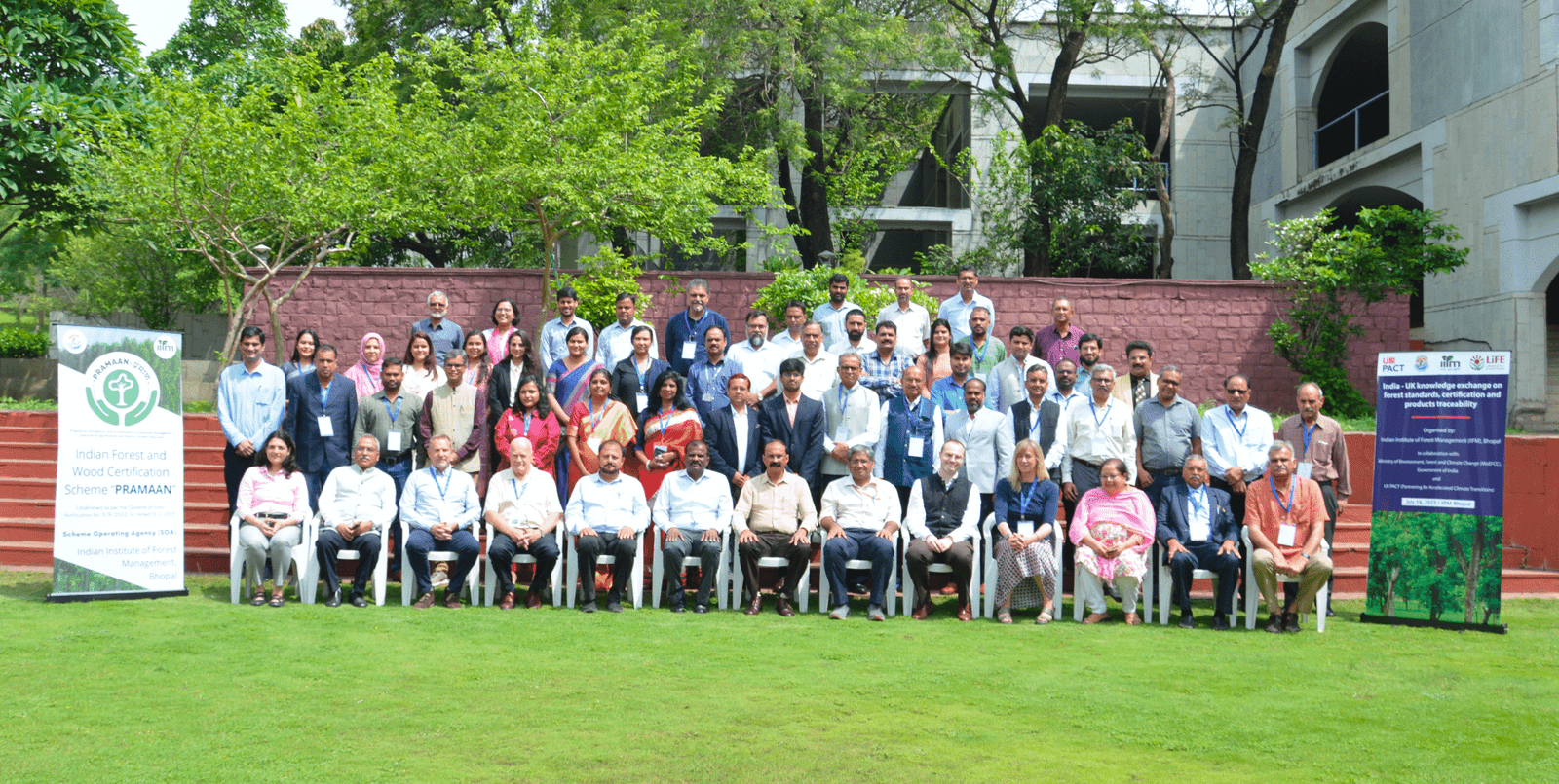Wednesday, 12 November 2025

In a global economy increasingly governed by traceability, compliance, and climate resilience, timber is no longer just wood—it’s a test of governance. This week, the Indian Institute of Forest Management (IIFM), Bhopal, became the nexus of a new chapter in Indo-UK cooperation as it hosted a high-level knowledge exchange on forest standards, certification, and product traceability.
Supported by India’s Ministry of Environment, Forest and Climate Change (MoEFCC) and the UK Government under the UK PACT (Partnering for Accelerated Climate Transitions) initiative, the workshop marks a critical pivot toward formalising India’s forest and agroforestry economy within globally recognised sustainability frameworks. For a sector long shaped by informal trade and invisible ecosystems, this gathering represents both a structural and strategic inflection point.
The Politics of Proof
Forests occupy a uniquely complex policy space—simultaneously acting as climate buffers, biodiversity repositories, and critical sources of rural livelihoods. Yet forest-derived products—from timber to non-timber forest produce—continue to struggle with fragmented traceability, informal trade channels, and inconsistent compliance with international sustainability standards.
The introduction of the Indian Forest and Wood Certification Scheme (IFWCS)–PRAMAAN in December 2023, as outlined by IIFM Director Dr. K. Ravichandran during the workshop, signals India’s first institutional effort to address that asymmetry. PRAMAAN is not just a national certification initiative; its underlying ambition is global. It seeks mutual recognition across jurisdictions—enabling Indian-certified wood and agroforestry products to enter high-regulation markets like the EU and UK. Anchored by a third-party verification model, it covers natural forests, plantations, trees outside forests (ToFs), and processed goods, ensuring both ecological and commercial credibility.
Learning from the UK: Compliance, Communities, and Carbon
Owain Roberts, Head of Climate Change Policy at the British High Commission, underlined the workshop’s broader purpose: “Sustainable agroforestry and traceability measures not only build resilience for smallholder farmers—they lay the groundwork for robust, globally integrated forest economies.”
Experts from UK’s Forest Research shared insights on the design and evolution of British certification systems, engaging with Indian stakeholders from MoEFCC, CIFOR-ICRAF, NABARD, Greenlam, FIPPI, and Incube. Deliberations focused on adapting these learnings to Indian conditions—where forest and agroforestry landscapes are diverse, decentralised, and largely smallholder-driven.
Key themes included compliance with due diligence requirements under the EU Deforestation Regulation (EUDR), the creation of robust governance and verification systems, and the integration of smallholders and indigenous communities into certification mechanisms. Participants also discussed the development of digital traceability infrastructure for timber and non-timber forest products (NTFPs), critical for building trust with global buyers.
Breakout sessions made it clear that India cannot simply replicate global frameworks—it must innovate context-specific certification models that reflect its ecological heterogeneity and socio-economic complexity. Certification here must do double duty: ensure ecological stewardship while delivering tangible income and inclusion benefits to rural producers.
Towards a Certified Green Economy
India’s agroforestry sector, spanning nearly 13.5 million hectares and supporting millions of livelihoods, is a latent climate and trade asset. Yet in the absence of robust certification and traceability systems, the sector’s potential—both in terms of carbon credits and sustainable exports—remains under-realised.
The presence of NABARD and private sector actors such as Greenlam highlighted a pivotal shift: forest certification is no longer a conservationist niche—it is becoming central to green finance, ESG compliance, and international market access. As scrutiny around deforestation-linked commodities intensifies, verified sourcing is emerging as a non-negotiable requirement for exporters and retailers.
A Future Built on Mutual Recognition
The workshop concluded with strong consensus around the need for sustained India–UK technical cooperation. As global regulations tighten, particularly under the EU’s green deal architecture and UK’s net-zero targets, bilateral engagements like this are essential. They help co-develop frameworks that meet the dual imperatives of global compliance and local relevance.
If institutionalised effectively, PRAMAAN could become the backbone of a new Indian forest economy—one that is inclusive, climate-aligned, and globally credible. In this new era, the value of a forest is no longer measured solely in timber or carbon—but in the trust, transparency, and governance systems that underpin its products.
As the world shifts toward low-carbon, high-integrity trade, India’s ability to deliver traceable, certified forest products will determine whether its natural capital is recognised—or discounted—on the global stage.